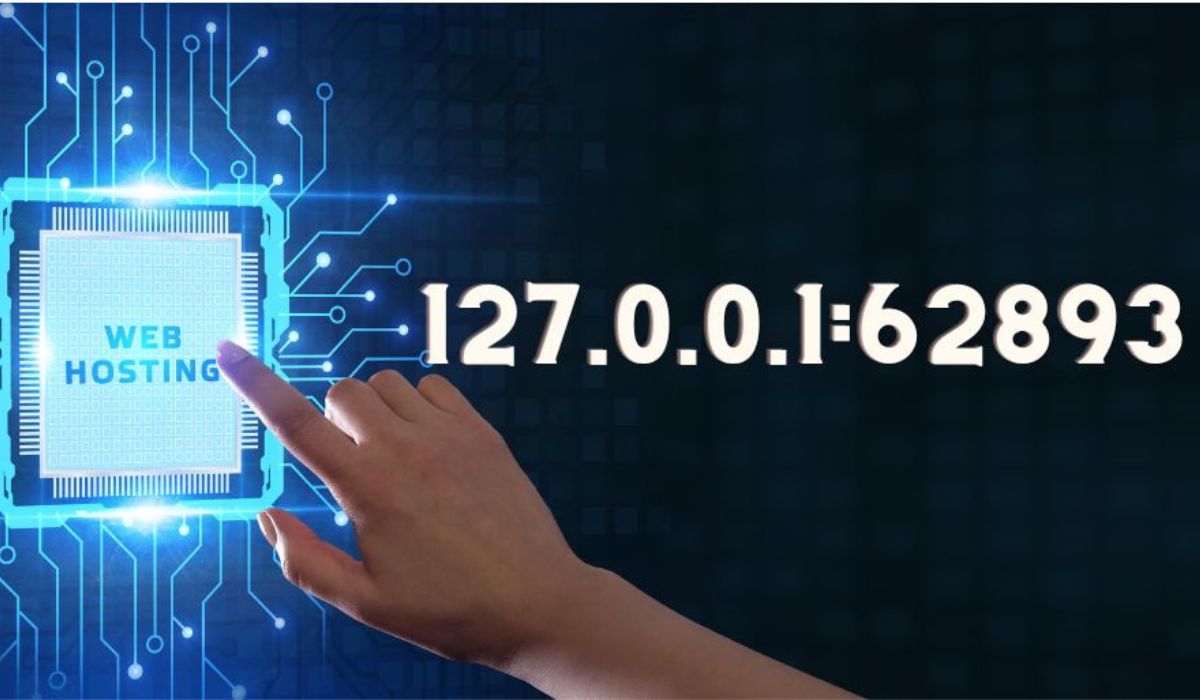Are you curious about what 127.0.0.1:62893 means in the world of computing? While it might look like a mysterious code at first glance, it’s actually a fundamental concept for developers and network enthusiasts. This article aims to demystify this code, making it easy to understand for readers of all ages. We’ll explore the significance of localhost, the role of port numbers, and why 127.0.0.1:62893 can be vital for testing, security, and creating isolated environments.
What is 127.0.0.1:62893?
A Simple Breakdown of the Code
In the realm of computer networking, 127.0.0.1 is more than just a collection of numbers separated by dots. It is known as the “loopback” address, and it’s a special IP address reserved for communication within the device itself. Think of it as your computer talking to itself.
The number 62893, meanwhile, represents a port number. Ports function like doors in a building, allowing data to enter and exit through specific channels. Together, 127.0.0.1 and 62893 create a unique identifier that developers utilize for various purposes.
The Significance of Localhost
The term “localhost” is synonymous with 127.0.0.1. It plays a critical role in software development and testing. By directing network requests to the local machine, developers can simulate interactions without needing an internet connection. This setup is invaluable for debugging and ensuring that applications work as intended before going live.
The Role of Port Numbers
Port numbers, like 62893, are crucial for directing traffic to the correct service on a computer. Each port corresponds to a specific process or application, enabling multiple services to run simultaneously without interference. Understanding and using port numbers effectively can streamline the development process and ensure secure communication.
Why is 127.0.0.1:62893 Important?
The Benefits of Using Localhost
Employing 127.0.0.1 for local network communication offers several benefits. For one, it allows developers to test applications in a controlled environment. This setup ensures that code behaves as expected without external disruptions. Additionally, localhost provides a safe space for experimentation, reducing the risk of exposing sensitive data to the broader internet.
Enhanced Security and Privacy
Using localhost alongside specific port numbers, such as 62893, enhances security and privacy. It restricts access to data and applications, ensuring that only authorized users can interact with them. This isolation is particularly important for sensitive projects where confidentiality is paramount.
Efficient Development and Testing
By leveraging 127.0.0.1 and port numbers, developers can streamline their workflow. They can quickly identify and fix issues, iterate on solutions, and deploy improvements—all within a secure, local environment. This efficiency translates into faster development cycles and higher-quality software.
Isolated Environments for Specific Applications
Creating isolated environments with 127.0.0.1 and port numbers allows developers to run multiple applications simultaneously. Each application can operate independently, reducing the risk of conflicts and ensuring seamless performance. This capability is essential for testing complex systems and optimizing resource allocation.
Understanding the Components
127.0.0.1 The Loopback Address
What is a Loopback Address?
A loopback address is a special IP address used for internal testing and communication. It allows a device to send and receive data packets to itself, bypassing external networks. This functionality is vital for debugging and verifying network configurations.
How it Differs from Other IP Addresses
Unlike typical IP addresses, which facilitate communication between devices, a loopback address is strictly internal. It never leaves the device, providing a secure channel for local testing and development. This distinction makes it a valuable tool for developers worldwide.
Why It’s Essential for Local Network Communication
The loopback address serves as the foundation for localhost communication. It ensures that data remains within the device, protecting it from outside interference. This security feature is crucial for maintaining the integrity of sensitive applications and data.
62893 The Port Number
The Concept of Port Numbers
Ports are numerical identifiers that direct data to specific applications on a device. They function like virtual doors, allowing information to flow to the correct service. By assigning unique port numbers, developers can manage multiple processes concurrently.
How They Are Assigned to Services
Operating systems automatically assign port numbers based on the needs of running applications. Developers can also specify port numbers manually to designate specific services. This level of control is essential for customizing network configurations and optimizing performance.
Common Port Numbers and Their Uses
Some port numbers are widely recognized for their association with specific services. For example, port 80 is typically used for HTTP traffic, while port 443 handles HTTPS encryption. By understanding these conventions, developers can ensure compatibility and security.
Why 62893 Might Be Used in Specific Scenarios
Port 62893 may be chosen for its availability and specificity. In some cases, developers select higher port numbers to avoid conflicts with common services. By using less standardized ports, they can create unique, isolated environments tailored to their needs.
Common Use Cases
Web Development and Testing
Setting Up Local Servers
Local servers enable developers to mirror production environments on their devices. By using 127.0.0.1 and specific port numbers like 62893, they can test web applications without relying on external servers. This setup simplifies the development process and reduces latency.
Testing Web Applications Without Internet Access
Localhost testing allows developers to evaluate applications offline. By simulating internet connections on their devices, they can identify issues and implement fixes without an active internet connection. This flexibility is invaluable for developing robust, reliable software.
Using Tools Like XAMPP and MAMP
Platforms like XAMPP and MAMP provide ready-to-use local server environments. These tools streamline the setup process, enabling developers to focus on coding and testing. By leveraging localhost capabilities, they can optimize their workflow and accelerate development.
Game Development
Local Multiplayer Gaming
For game developers, 127.0.0.1 and port numbers facilitate local multiplayer experiences. By directing traffic to the same device, players can enjoy seamless interactions without latency. This functionality is crucial for testing and refining multiplayer mechanics.
Testing Game Servers
Game developers use localhost to simulate server environments on their devices. By testing servers locally, they can identify performance bottlenecks and implement optimizations. This process ensures that final products deliver smooth, engaging experiences for players.
Software Development
Debugging and Troubleshooting
Debugging is a critical aspect of software development, and localhost provides a controlled environment for this purpose. By conducting tests on 127.0.0.1, developers can identify and resolve issues efficiently. This approach minimizes errors and enhances software quality.
Testing Network-Based Applications
Network-based applications rely on seamless data exchange, and localhost facilitates this process. By using 127.0.0.1 and port numbers, developers can evaluate how their applications handle network traffic. This testing ensures that products perform optimally in real-world scenarios.
Troubleshooting 127.0.0.1:62893 Errors
Common Errors and Their Causes
Firewall Restrictions
Firewalls play a vital role in network security, but they can sometimes block localhost traffic. If 127.0.0.1 encounters connectivity issues, firewalls may be the culprit. By reviewing firewall settings, developers can ensure that local connections are permitted.
Port Conflicts
Port conflicts occur when multiple services attempt to use the same port simultaneously. This issue can disrupt network communication and lead to errors. Identifying and resolving port conflicts is essential for maintaining smooth operations.
Incorrect Configuration
Misconfigured settings can prevent localhost from functioning correctly. If 127.0.0.1 experiences errors, developers should verify their network configurations. Ensuring accuracy can help restore connectivity and improve performance.
Troubleshooting Tips
Checking Firewall Settings
Reviewing firewall rules can help identify and resolve connectivity issues. By allowing localhost traffic, developers can ensure that 127.0.0.1 operates smoothly. This step is crucial for maintaining uninterrupted development workflows.
Identifying Port Conflicts
Tools like netstat and lsof can help detect port conflicts on a device. By identifying services using the same port, developers can reassign numbers to eliminate conflicts. This approach ensures that applications run without disruption.
Verifying Network Settings
Accurate network settings are essential for localhost functionality. Developers should double-check their configurations to ensure compatibility. Correcting errors can help restore connectivity and enhance overall performance.
Using Network Diagnostic Tools
Network diagnostic tools provide valuable insights into connectivity issues. By analyzing localhost traffic, developers can identify problems and implement solutions. These tools are indispensable for maintaining reliable, high-performing networks.
Security Considerations
Potential Security Risks
Exposure to Vulnerabilities
Despite its security benefits, localhost is not immune to vulnerabilities. Developers must remain vigilant to protect their systems from potential threats. Regular updates and patches can help mitigate risks and maintain security.
Unauthorized Access
Unauthorized access can compromise localhost environments. Developers should implement strong passwords and authentication measures to prevent breaches. This proactive approach safeguards sensitive data and applications.
Best Practices for Secure Localhost Usage
Strong Passwords and Security Measures
Strong, unique passwords are a fundamental security measure for localhost environments. Developers should prioritize password strength to protect their systems. Additional measures, such as two-factor authentication, can further enhance security.
Limiting Access to Local Services
Access control is vital for maintaining localhost security. Developers should restrict local services to authorized users only. This limitation minimizes the risk of unauthorized access and protects sensitive information.
Keeping Software Up-to-Date
Regular software updates are essential for maintaining security. Developers should ensure that their systems are current to benefit from the latest patches and enhancements. Staying up-to-date helps protect against emerging threats.
YOU MAY ALSO LIKE: Unlocking the Power of 941-291-1453 for Seamless Communication
Conclusion
In the world of development and networking, understanding 127.0.0.1:62893 is essential. This guide has explored its significance, components, and common use cases, highlighting its importance for testing, security, and creating isolated environments. By leveraging localhost effectively, developers can enhance their workflows, protect sensitive data, and create high-quality applications. For those looking to deepen their understanding, exploring further resources and tools is highly recommended. Start your localhost journey today and unlock the full potential of this powerful tool.
FAQs
What is 127.0.0.1 used for?
127.0.0.1 is the loopback address used for testing and communication within a device.
Why do developers use port numbers like 62893?
Developers use port numbers to direct data to specific services on a device.
How does using localhost enhance security?
Localhost restricts access to data, minimizing exposure to external threats.
Can localhost be accessed remotely?
No, localhost is strictly for internal device communication.
What tools help troubleshoot localhost errors?
Tools like netstat and network diagnostic utilities help identify and resolve localhost issues.











